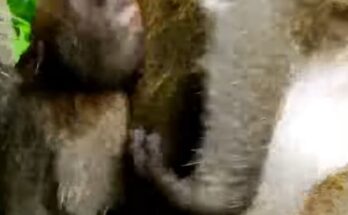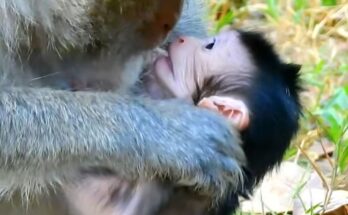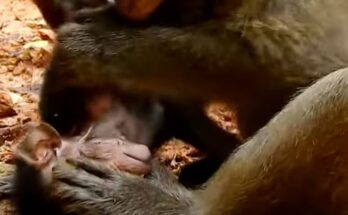In the animal kingdom, parental care is often a key component of species survival, with mothers typically providing nurturing and protective care to their offspring. However, instances of harsh or abusive behavior by mothers toward their young can also occur, particularly in social species like monkeys. A striking and heartbreaking example of this is the behavior exhibited by some mother monkeys who reject, abuse, or neglect their infants.
One notable example is the behavior observed in certain species of macaques. These monkeys are known for their complex social structures and strong maternal bonds, yet cases of maternal rejection and abuse are not unheard of. Such situations can be particularly distressing to observe, as they go against the nurturing image often associated with motherhood. For instance, a baby monkey (commonly referred to as a “BB monkey” in some circles) might desperately seek its mother’s attention and nourishment, only to be met with aggressive behavior instead of care.
The Baby’s Plea for Milk
In many cases, the young monkey, still dependent on its mother’s milk for survival, will approach her with visible desperation. The infant might cling to her fur, reach out its tiny hands, or cry in a high-pitched tone meant to elicit a caregiving response. However, in some instances, the mother responds with rejection or outright aggression. She may push the baby away, slap it, or even bite it. The baby’s cries often escalate as it becomes clear that its basic needs are not being met.
Observers often describe these scenes as painful to watch. The baby’s attempts to nurse are thwarted repeatedly, leaving it hungry, weak, and emotionally distressed. Such behavior may seem cruel and unfathomable from a human perspective, but understanding the potential causes of this maternal behavior can provide a deeper insight into the dynamics at play.
Potential Causes of Abusive Behavior
- Stress and Environmental Pressures: Mother monkeys living in high-stress environments—such as those with limited resources, overcrowding, or constant threats—may display heightened aggression. Stress can impair a mother’s ability to provide proper care, leading to neglect or abusive behavior toward her infant.
- Social Hierarchy and Competition: In species like macaques, social hierarchies are well-defined and can be brutal. Lower-ranking mothers may face significant social stress from dominant individuals, which could impact their maternal behavior. Additionally, competition for resources can make it difficult for these mothers to provide adequate care.
- Inexperience or Immaturity: First-time mothers, particularly those who are young, might lack the skills or instinct to properly care for their offspring. Inexperience can result in neglect or rough handling, even if the mother’s intentions are not inherently harmful.
- Health Issues: Physical or mental health problems can also affect a mother’s behavior. A mother suffering from malnutrition, illness, or hormonal imbalances may struggle to meet her baby’s needs or may react aggressively.
- Behavioral Abnormalities: In some cases, maternal aggression may stem from behavioral abnormalities. This could be due to trauma, learned behavior, or genetic predispositions. For instance, a mother who experienced abuse or neglect as an infant might be more likely to display similar behavior toward her own offspring.
The Impact on the Infant
The consequences of maternal neglect and abuse can be devastating for the infant monkey. Without proper nourishment and care, the baby’s physical health deteriorates rapidly. Emotional and social development can also be severely affected, as early interactions with the mother play a crucial role in shaping the infant’s ability to bond and interact with others later in life.
In extreme cases, prolonged neglect or abuse can lead to the baby’s death. Even if the infant survives, it may carry the psychological scars of this early trauma, which could manifest in abnormal behaviors as it grows older.
Interventions and Ethical Considerations
When such behavior is observed in captive or semi-captive settings, such as zoos or wildlife sanctuaries, caretakers may attempt to intervene. They might provide supplemental feeding for the infant or, in severe cases, remove the baby from the mother to ensure its survival. However, such interventions come with their own challenges, as separating the infant from its mother can have long-term effects on its development and social integration.
In the wild, interventions are rarely possible, leaving the baby to fend for itself or rely on the support of other group members. Interestingly, in some monkey species, other females within the group, such as aunts or older siblings, may step in to care for the neglected baby. This phenomenon, known as alloparenting, can sometimes provide a lifeline for the infant.
A Window into Primate Behavior
While the behavior of abusive mother monkeys may seem shocking, it serves as a poignant reminder of the complexities of the natural world. It also highlights the parallels between human and non-human primates, particularly when it comes to the impact of environment, stress, and social dynamics on parenting.
Ultimately, studying these behaviors can help researchers better understand the factors that contribute to maternal care or neglect, offering valuable insights not only into the lives of monkeys but also into the broader dynamics of caregiving across species. It is a sobering yet important aspect of animal behavior that underscores the challenges many creatures face in their struggle to survive and thrive.


